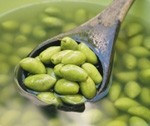Hidrox global launch based on Med diet, joint health
olive-derived Hidrox ingredient to Europe, Asia, Latin America and
Africa, aimed at foods related to the Mediterranean lifestyle and
joint health supplements.
DSM signed a global license agreement for the supply, distribution and marketing of Hidrox with developer CreAgri in April, which included exclusive access to its patents. The US industry launch took place in August.
The formulation, in which hydroxytyrosol is the main antioxidant and polyphenol, is produced using a patented process from waste-water that results from organic olive oil production. Registering an ORAC value of 27,000, hydroxytyrosol offers remarkably high free radical protection.
DSM's marketing angle for foods hooks on to the burgeoning interest in the healthy Mediterranean lifestyle, which stems from a slate of studies indicating its role in disease risk reduction and longevity.
Along with fish and fresh vegetables, olives and olive oil form a central part of the Mediterranean diet. Scientific thought links the beneficial consumption of olive oil - in particular for heart health - to its high content of monounsaturated fatty acids (MUFA) and antioxidants such as phenolic compounds, vitamin E and beta-carotene.
DSM is also marketing Hidrox on the basis of its data to support its anti-inflammatory properties, which make it suitable for supplements in the burgeoning joint health category.
Global product manager Dr Wiltrud Baier of DSM's new business development, human nutrition and health division, told NutraIngredients.com that the US launch came first because CreAgri already had already established sales channels in the market.
In the newly announced markets it will be sold through DSM Nutritional Products' established channels for other ingredients.
Dr Baier said that awareness of the Mediterranean diet is expected to aid sales of Hidrox.
In European markets there is already a high awareness of the benefits of the southern lifestyle, but consumer patterns are increasingly towards convenience - a trend in which packaged foods figure large.
Moreover, in parts of the continent where olives do not grow, such as the UK, imported fruit carries additional cache as it is often sold at a premium in delicatessens. It is reasonable to expect that some of this cache will be transferred to foods containing olive-derived ingredient.
There is also a high awareness of the Mediterranean way of eating in the Japanese market, according to Dr Baier.
In the US, the Mediterranean lifestyle may start to be on more people's lips in 2007 as not-for-profit nutrition group Oldways is set to make communication of Mediterranean foods a priority.
Oldways said last month that it hopes the diet will come to be associated with "hundreds and hundreds" of products within a few years.
The big push will involve a two-fold process: a public education campaign to increase people's awareness of the diet's healthfulness, as well as the launch of a consumer-friendly symbol designed to flag up food products that fit the Mediterranean bill.
For DSM's part, Dr Baier said that Hidrox will be a fit with products that are already linked with the Mediterranean diet - tomato sauce, for instance, and salad dressing.
The company has called the global launch of Hidrox "an important step in [its] new strategic direction".
Born out of the 2003 acquisition of Roche Vitamins, DSM Nutritional Products has been steadily reducing its reliance on vitamin production (a mature market that is subject to much price pressure) in favour of new nutrients that have solid science behind them.
Other ingredients in its portfolio include TeaVigo green tea extract and Bonistein high-purity genistein.













